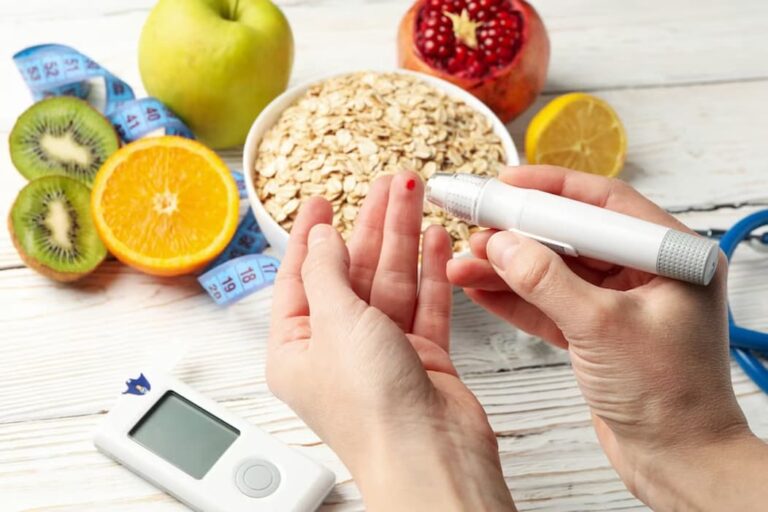
Insulin is an essential hormone in our body that helps absorb glucose and maintain the balance of blood sugar levels for a healthy metabolism. The pancreas produces it and transfers the glucose to our entire body. At the point when you have insulin resistance diet, that equilibrium escapes whack.
When the cells in our body don’t respond well to insulin, a condition called insulin resistance occurs. As a result, the pancreas secretes more insulin to meet the body’s needs and to help glucose enter our cells.
People suffering from insulin resistance diet are relatively at higher risk of developing diabetes. But there is some good news. You may be able to reduce your likelihood of developing this condition with healthy diet and lifestyle changes.
A well balanced diet can make a significant difference when it comes to preventing diabetes.
Here is a list of some insulin resistance diet that you need to incorporate into your everyday diet to help improve your insulin sensitivity.
What to Eat For an Insulin Resistance Diet?
The most promising way to maintain a healthy balance between blood sugar levels is to adjust your macronutrient ratio in every meal. Moreover, saturated fats have been linked with higher chances of insulin resistance diet.
Therefore, try to shift towards healthy and unsaturated fats. Additionally, consuming high-fiber foods and mixed meals can also help slow your digestion and take pressure off your pancreas.
Here are some foods for insulin resistance that you need to focus your diet around:
1. Vegetables
Vegetables are generally low in carbohydrates and high in dietary fiber. They also contain certain vitamins and minerals that are essential for our body’s normal functioning. Leafy green vegetables are rich in polyphenols that act as antioxidants. These antioxidants can lower the risk of diabetes to a great extent.
So, for optimal health, it’s recommended that people should eat a wide variety of vegetables. These insulin-resistant vegetables typically include carrots, onions, kale, spinach, broccoli, tomatoes, asparagus, cucumber, lettuce, etc.
2. Fruits
Fruits are high in fiber and comprise a wide range of essential minerals, vitamins, antioxidants, and phytochemicals. All of these can effectively benefit our health and lower the risks of diabetes.
Moreover, some fruits are incredible sources of micronutrients that are essential for our overall health and optimal cellular function.
Such fruits typically include blueberries, strawberries, blackberries, raspberries, limes, avocados, green bananas, coconut, and avocados.
3. Dairy Products
Low-fat dairy products are linked with a decreased risk of type 2 diabetes. However, too much milk consumption may cause a spike in your blood sugar levels.
That’s why if you’re diagnosed with prediabetes or diabetes 2, try to opt for unsweetened flax milk. It contains the least amount of carbs and is an ideal option for people who are at a higher risk of diabetes.
4. Beans and Legumes:
Beans and legumes are considered a superfood for diabetes, meaning they provide many health and nutritional benefits. Black beans, chickpeas, and kidney beans are excellent food choices for diabetics as they all have a glycemic index (GI) of less than 40. Hence, these foods don’t significantly raise blood glucose levels.
5. Meat
People suffering from insulin resistance diet can include certain meat products in their diets, such as lean meat, fish, and other plant-based alternatives. However, they should avoid consuming meat high in saturated fat to reduce the risk of diabetes, high cholesterol, and cardiovascular problems.

What Foods Should You Limit?
Highly processed foods digest quite quickly and can spike blood sugar levels. This places unwanted pressure and stress on the pancreas, which disrupts the healthy balance of blood sugar levels.
If you are suffering from insulin resistance diet issues, try to minimize the high intake of food items like pasta, white bread, white rice, cookies, candies, ultra-processed snacks, cakes, chips, soda, and juices.
Tips for Creating a Balanced, Insulin-Resistant Diet
Here are some effective tips that will undoubtedly help you adopt a well-balanced and insulin resistance diet:
- Create a meal plan.
- Opt for a diet rich in unprocessed foods.
- Cut down the consumption of highly processed foods containing added artificial fats, sugars, and salt.
- Stay consistent.
- Choose non-starchy vegetables.
- Try to eat more fiber.
- Reduce your intake of calories.
- Work hard to achieve and maintain a healthy weight.
The Bottom Line
By making certain lifestyle modifications and changing what you eat, you can certainly reduce your insulin resistance diet. By sticking to the above-mentioned diet and staying consistent, you can even reverse conditions like prediabetes and type 2 diabetes.
However, you don’t need to completely cut down any food items from your daily diet. Instead, try to stay aware of how certain foods will impact your blood sugar levels and how you can manage them with healthy food choices.
FAQs:
Are Eggs Good for Insulin Resistance?
Eggs are an amazing source of protein with all the essential amino acids. This makes them a perfect choice for weight management and for overcoming insulin resistance.
A study has found that people suffering from prediabetes or type 2 diabetes showed a significant 4.4% reduction in blood sugar levels and improvements in insulin sensitivity by eating one egg every day.
Is Fasting Good for Insulin Resistance?
Fasting can exert various positive effects on the health of people suffering from insulin resistance. The major benefit of periodic fasting is the improvement of insulin sensitivity by stabilizing metabolic health.
In addition to that, intermittent fasting can promote weight loss and deliver multiple powerful benefits to our entire body.
How Can I Reduce My Insulin Resistance?
Insulin resistance can eventually result in various chronic health conditions like diabetes, cardiovascular disorders, and coronary artery disease. But with early diagnosis and the right approach, it is reversible.
By incorporating the following tips into your daily lifestyle, you can effectively reduce your insulin resistance diet sensitivity.
- Get active and exercise daily.
- If you are overweight, try to achieve a healthy weight.
- Shift towards insulin-resistant food items.